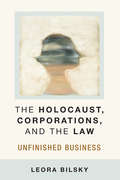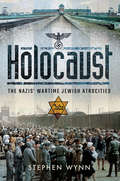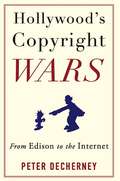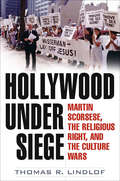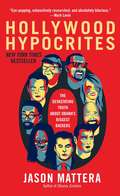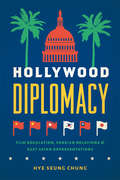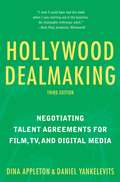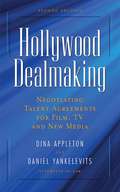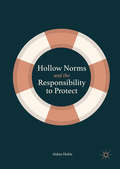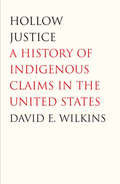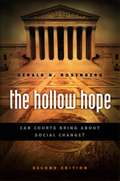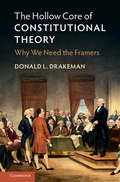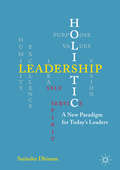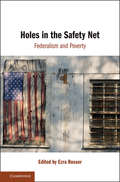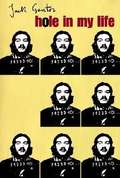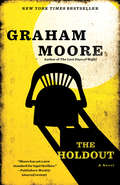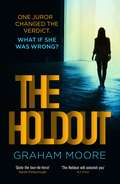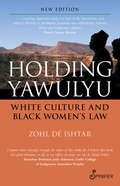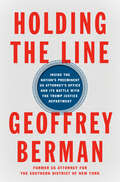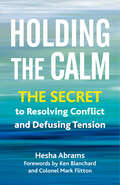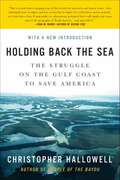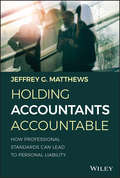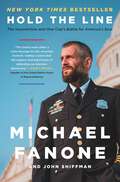- Table View
- List View
The Holocaust, Corporations, and the Law: Unfinished Business
by Leora Yedida BilskyThe Holocaust, Corporations, and the Law explores the challenge posed by the Holocaust to legal and political thought by examining issues raised by the restitution class action suits brought against Swiss banks and German corporations before American federal courts in the 1990s. Although the suits were settled for unprecedented amounts of money, the defendants did not formally assume any legal responsibility. Thus, the lawsuits were bitterly criticized by lawyers for betraying justice and by historians for distorting history. Leora Bilsky argues class action litigation and settlement offer a mode of accountability well suited to addressing the bureaucratic nature of business involvement in atrocities. Prior to these lawsuits, legal treatment of the Holocaust was dominated by criminal law and its individualistic assumptions, consistently failing to relate to the structural aspects of Nazi crimes. Engaging critically with contemporary debates about corporate responsibility for human rights violations and assumptions about “law,” she argues for the need to design processes that make multinational corporations accountable, and examines the implications for transitional justice, the relationship between law and history, and for community and representation in a post-national world. Her novel interpretation of the restitution lawsuits not only adds an important dimension to the study of Holocaust trials, but also makes an innovative contribution to broader and pressing contemporary legal and political debates. In an era when corporations are ever more powerful and international, Bilsky’s arguments will attract attention beyond those interested in the Holocaust and its long shadow.
Holocaust and Genocide Denial: A Contextual Perspective
by Paul Behrens Olaf Jensen Nicholas TerryThis book provides a detailed analysis of one of the most prominent and widespread international phenomena to which criminal justice systems has been applied: the expression of revisionist views relating to mass atrocities and the outright denial of their existence. Denial poses challenges to more than one academic discipline: to historians, the gradual disappearance of the generation of eyewitnesses raises the question of how to keep alive the memory of the events, and the fact that negationism is often offered in the guise of historical 'revisionist scholarship' also means that there is need for the identification of parameters which can be applied to the office of the 'genuine' historian. Legal academics and practitioners as well as political scientists are faced with the difficulty of evaluating methods to deal with denial and must in this regard identify the limits of freedom of speech, but also the need to preserve the rights of victims. Beyond that, the question arises whether the law can ever be an effective option for dealing with revisionist statements and the revisionist movement. In this regard, Holocaust and Genocide Denial: A Contextual Perspective breaks new ground: exploring the background of revisionism, the specific methods devised by individual States to counter this phenomenon, and the rationale for their strategies. Bringing together authors whose expertise relates to the history of the Holocaust, genocide studies, international criminal law and social anthropology, the book offers insights into the history of revisionism and its varying contexts, but also provides a thought-provoking engagement with the challenging questions attached to its treatment in law and politics.
Holocaust: The Nazis' Wartime Jewish Atrocities
by Stephen Wynn“Trace[s] the developing Holocaust from the Odessa Massacre . . . a very good point to start into understanding this terrible genocide.” —FiretrenchIn Holocaust, Stephen Wynn looks at the build up to the Second World War, from the time of Hitler’s appointment as Chancellor of Germany in January 1933, as the Nazi Party rose to power in a country that was still struggling to recover politically, socially and financially from the aftermath of the First World War, while at the same time, through the enactment of a number of laws, making life extremely difficult for German Jews. Some saw the dangers ahead for Jews in Germany and did their best to get out, some managed to do so, but millions more did not. The book then moves on to look at a wartime Nazi Germany and how the dislike of the Jews had gone from painting the star of David on shop windows, to their mass murder in the thousands of concentration camps that were scattered throughout Germany. As well as the camps, it looks at some of those who were culpable for the atrocities that were carried out in the name of Nazism. Not all those who were murdered lost their lives in concentration camps. Some were killed in massacres, some in ghettos and some by the feared and hated Einsatzgruppen.“Historical studies like Holocaust: The Nazis’ Wartime Jewish Atrocities are increasingly necessary to remind present and future generations of what can happen when the forces of bigotry and racially motivated hatred goes unchecked in even the most civilized of nations.” —Midwest Book Review
Hollywood’s Copyright Wars: From Edison to the Internet (Film and Culture Series)
by Peter DecherneyCopyright law is important to every stage of media production and reception. It helps determine filmmakers' artistic decisions, Hollywood's corporate structure, and the varieties of media consumption. The rise of digital media and the internet has only expanded copyright's reach. Everyone from producers and sceenwriters to amateur video makers, file sharers, and internet entrepreneurs has a stake in the history and future of piracy, copy protection, and the public domain. Beginning with Thomas Edison's aggressive copyright disputes and concluding with recent lawsuits against YouTube, Hollywood's Copyright Wars follows the struggle of the film, television, and digital media industries to influence and adapt to copyright law. Many of Hollywood's most valued treasures, from Modern Times (1936) to Star Wars (1977), cannot be fully understood without appreciating their legal controversies. Peter Decherney shows that the history of intellectual property in Hollywood has not always mirrored the evolution of the law. Many landmark decisions have barely changed the industry's behavior, while some quieter policies have had revolutionary effects. His most remarkable contributions uncover Hollywood's reliance on self-regulation. Rather than involve congress, judges, or juries in settling copyright disputes, studio heads and filmmakers have often kept such arguments "in house," turning to talent guilds and other groups for solutions. Whether the issue has been battling piracy in the 1900s, controlling the threat of home video, or managing modern amateur and noncommercial uses of protected content, much of Hollywood's engagement with the law has occurred offstage, in the larger theater of copyright. Decherney's unique history recounts these extralegal solutions and their impact on American media and culture.
Hollywood Under Siege: Martin Scorsese, the Religious Right, and the Culture Wars
by Thomas R. LindlofA behind-the-scenes look at the making of The Last Temptation of Christ and the controversy following its release.In 1988, director Martin Scorsese fulfilled his lifelong dream of making a film about Jesus Christ. Rather than celebrating the film as a statement of faith, churches and religious leaders immediately went on the attack, alleging blasphemy. At the height of the controversy, thousands of phone calls a day flooded the Universal switchboard, and before the year was out, more than three million mailings protesting the film fanned out across the country. For the first time in history, a studio took responsibility for protecting theaters and scrambled to recruit a “field crisis team” to guide The Last Temptation of Christ through its contentious American openings. Overseas, the film faced widespread censorship actions, with thirteen countries eventually banning the film. The response in Europe turned violent when opposition groups sacked theaters in France and Greece and caused injuries to dozens of moviegoers.Twenty years later, author Thomas R. Lindlof offers a comprehensive account of how this provocative film came to be made and how Universal Pictures and its parent company MCA became targets of the most intense, unremitting attacks ever mounted against a media company. The film faced early and determined opposition from elements of the religious Right when it was being developed at Paramount during the last year the studio was run by the celebrated troika of Barry Diller, Michael Eisner, and Jeffrey Katzenberg. By the mid-1980s, Scorsese’s film was widely regarded as unmakeable?a political stick of dynamite that no one dared touch. Through the joint efforts of two of the era’s most influential executives, CAA president Michael Ovitz and Universal Pictures chairman Thomas P. Pollock, this improbable project found its way into production. The making of The Last Temptation of Christ caught evangelical Christians at a moment when they were suffering a crisis of confidence in their leadership. The religious right seized on the film as a way to rehabilitate its image and to mobilize ordinary citizens to attack liberalism in art and culture. The ensuing controversy over the film’s alleged blasphemy escalated into a full-scale war fought out very openly in the media. Universal/MCA faced unprecedented calls for boycotts of its business interests, anti-Semitic rhetoric and death threats were directed at MCA chairman Lew Wasserman and other MCA executives, and the industry faced the specter of violence at theaters.Hollywood Under Siege draws upon interviews with many of the key figures?Martin Scorsese, Paul Schrader, Michael Ovitz, Jeffrey Katzenberg, Jack Valenti, Thomas P. Pollock, and Willem Dafoe?to explore the trajectory of the film from its conception to the subsequent epic controversy and beyond. Lindlof offers a fascinating dissection of a critical episode in the embryonic culture wars, illuminating the explosive effects of the clash between the interests of the media industry and the forces of social conservatism.Praise for Hollywood Under Siege“No other book has traced the development of a major motion picture from conception through production to reception with the kind of care and detail that Lindlof does here. Hollywood Under Siege provides valuable insight into the machinery of the film industry, and into the machinations of American culture on a broader front as well.” —Thomas Schatz, author of The Genius of the System: Hollywood Filmmaking in the Studio Era and Executive Director of the University of Texas Film Institute“Riveting and accurate. Even though I thought I knew the events, I found myself captured anew.” —Paul Schrader, screenwriter and director“As a study of a landmark moment in American cinema, Lindlof’s book is both profound and extremely entertaining.” —Los Angeles Times“Lindlof has meticulously researched the history of
Hollywood Hypocrites
by Jason MatteraTHE BOOK YOU'RE ABOUT TO READ WILL PISS YOU OFF. Are you sick of self-important celebrities preaching against "global warming," yet flying private planes to their countless homes? Fed up with lectures about charity and philanthropy from miserly rockers who will do anything for a tax break? Disgusted by leftist stars decrying the evils of the Second Amendment as their personal bodyguards pack more heat than a Chuck Norris kick to the face? The same Hollywood loons who got Barack Hussein Obama elected in 2008 will do so again in 2012. That is, unless we muzzle them. Four years ago, Republicans sat back like wimps and let Obama's celebrity-fueled cool machine steamroll them into electoral smithereens. This time, we must do the steamrolling. New York Times bestselling author of Obama Zombies and gonzo journalist Jason Mattera takes the first stand with Hollywood Hypocrites, as he slays the Left's sacred celebrity cows and teaches Obama's Tinseltown foot soldiers their most important lesson yet: No longer can they attempt to deny Americans the very liberties they use to catapult themselves to prosperity and stardom. In his trademark eye-opening, no-holds-barred, and hilarious style, Mattera puts scores of A-list celebrities, including Sting, Madonna, Bono, Al Gore, Alec Baldwin, Matt Damon, Cameron Diaz, Bruce Springsteen, and many, many more under the microscope to analyze whether they live by the same environmental, health, anti-violence, civil rights, and other policy prescriptions they seek to inflict on Americans. What he uncovers will shock you. Hollywood's megaphone is powerful, and the mainstream media's love affair with the president will roar back with a vengeance when their guy is against the wall. Anyone who thinks Barack Obama's abysmal first term will be enough to demoralize the Liberal Left Coast from flexing its mediated political muscle is a fool. It's time to recognize the marketing and fund-raising power the Hollywood Progressives wield. It's time to dig into the data and set the record straight. It's time to turn the media spotlight back on the image makers and prevent the Hollywood elite from hoodwinking American voters once again.
Hollywood Diplomacy: Film Regulation, Foreign Relations, and East Asian Representations
by Hye Seung ChungHollywood Diplomacy contends that, rather than simply reflect the West’s cultural fantasies of an imagined “Orient,” images of Chinese, Japanese, and Korean ethnicities have long been contested sites where the commercial interests of Hollywood studios and the political mandates of U.S. foreign policy collide, compete against one another, and often become compromised in the process. While tracing both Hollywood’s internal foreign relations protocols—from the “Open Door” policy of the silent era to the “National Feelings” provision of the Production Code—and external regulatory interventions by the Chinese government, the U.S. State Department, the Office of War Information, and the Department of Defense, Hye Seung Chung reevaluates such American classics as Shanghai Express and The Great Dictator and applies historical insights to the controversies surrounding contemporary productions including Die Another Day and The Interview. This richly detailed book redefines the concept of “creative freedom” in the context of commerce: shifting focus away from the artistic entitlement to offend foreign audiences toward the opportunity to build new, better relationships with partners around the world through diplomatic representations of race, ethnicity, and nationality.
Hollywood Dealmaking: Negotiating Talent Agreements for Film, TV, and Digital Media (Third Edition)
by Dina Appleton Daniel Yankelevits"I wish I could have had this book when I was starting out in the business. An invaluable reference work." —Alan Poul, producer, Westworld The legal resources of studios and networks are legendary, often intimidating independent producers, writers, actors, directors, agents, and others as they try to navigate through the maze of legal details. This invaluable reference presents the interests of talent as well as the point of view of creative executives, producers, entertainment attorneys, agents and managers, and major guilds—making clear the role that each plays in the dealmaking process. Readers will find expert insights to talent and production deals for television, feature film, video, and the Internet, as well as an in-depth overview of net profits and other forms of contingent compensation. Hollywood Dealmaking, Third Edition, also addresses digital and new platforms, changes resulting from new union agreements, and the evolution in feature film back-end (profit participation) deals. In addition, this comprehensive guide includes: Explanations of employment deals Details of rights acquisition Basics of copyright law Sample contracts and forms Glossary of industry lingo and terminology And much more! Peppered with facts on the deals of superstar players and with summaries in each section to clarify complex legal issues, Hollywood Dealmaking, Third Edition, is an essential resource for industry novices and veterans alike who want to sharpen their negotiation skills and finalize the deals they have been seeking.
Hollywood Dealmaking: Negotiating Talent Agreements
by Dina Appleton Daniel YankelevitsHollywood Dealmaking has become the go-to resource for new and experienced entertainment attorneys, agent trainees, business affairs executives, and creative executives. Entertainment attorneys and Hollywood insiders Dina Appleton and Daniel Yankelevits explain the negotiation techniques and strategies of entertainment dealmaking and detail the interests and roles of producers, writers, actors, directors, agents, and studio employees in crafting a deal. This new edition captures the dramatic changes over the past five years in the film and television industry landscape, with two new chapters: Reality Television details the sources of revenue, syndication possibilities, and format sales of these shows as well as the talent deals that are made and the Internet/New Media chapter delves in new digital formats such as mobile phones, game consoles, video-on-demand, and web-based apps, and explains where today's revenues are generated, where the industry is headed, and talent negotiation issues. All the ins and outs of negotiating are explained, including back ends, gross and adjusted gross profits, deferments, box office bonuses, copyrights, and much more. This easy-to-follow reference is packed with expert insights on distribution, licensing, and merchandising. The book's invaluable resource section includes definitions of lingo for acquisition agreements and employment deals, twelve ready-to-use sample contracts, and a directory of entertainment attorneys in both New York and Los Angeles. In Hollywood Dealmaking, readers will recognize the key players in the process, understand the "lingo" of crafting deals, learn how to negotiate agreements for the option and purchase of books and screenplays, be able to negotiate employment deals for all members of a film or television crew, understand payment terms and bonuses, and be able to register copyrights in scripts and other literary works.
Hollow Norms and the Responsibility to Protect
by Aidan HehirThis book explains why there is a pronounced disjuncture between R2P's habitual invocation and its actual influence, and why it will not make the transformative progress its proponents claim. Rather than disputing that R2P is a norm, or declaring that norms are insignificant, Hehir engages with post-positivist constructivist accounts on the role of norms to demonstrate first, that the efficacy of a norm is not directly related to the extent to which it is proliferated or invoked, and second, that in the post-institutionalization phase, norms undergo both contestation and (potentially regressive) reinterpretation. This volume analyses the evolution of R2P, and demonstrates that it has been steadily circumscribed and co-opted, so that today it has no power to meaningfully influence the behaviour of states. It is essential reading for academic audiences in the disciplines of International Relations and International Law.
Hollow Justice
by David E. WilkinsThis book, the first of its kind, comprehensively explores Native American claims against the United States government over the past two centuries. Despite the federal government’s multiple attempts to redress indigenous claims, a close examination reveals that even when compensatory programs were instituted, Native peoples never attained a genuine sense of justice. David E. Wilkins addresses the important question of what one nation owes another when the balance of rights, resources, and responsibilities have been negotiated through treaties. How does the United States assure that guarantees made to tribal nations, whether through a century old treaty or a modern day compact, remain viable and lasting?
The Hollow Hope: Can Courts Bring About Social Change? (2nd edition)
by Gerald N. RosenbergIn follow-up studies, dozens of reviews, and even a book of essays evaluating his conclusions, Gerald Rosenberg's critics-- not to mention his supporters-- have spent nearly two decades debating the arguments he first put forward in The Hollow Hope. With this substantially expanded second edition of his landmark work, Rosenberg himself steps back into the fray, responding to criticism and adding chapters on the same-sex marriage battle that ask anew whether courts can spur political and social reform. Finding that the answer is still a resounding no, Rosenberg reaffirms his powerful contention that it's nearly impossible to generate significant reforms through litigation. The reason? American courts are ineffective and relatively weak-- far from the uniquely powerful sources for change they're often portrayed as. Rosenberg supports this claim by documenting the direct and secondary effects of key court decisions-- particularly Brown v. Board of Education and Roe v. Wade. He reveals, for example, that Congress, the White House, and a determined civil rights movement did far more than Brown to advance desegregation, while pro-choice activists invested too much in the expense of political mobilization. Further illuminating these cases, as well as the on going fight for same-sex marriage rights, Rosenberg also marshals impressive evidence to overturn the common assumption that even unsuccessful litigation can advance a cause by raising its profile. Directly addressing its critics in a new conclusion, The Hollow Hope, Second Edition promises to reignite for a new generation the national debate it sparked seventeen years ago.
The Hollow Core of Constitutional Theory: Why We Need the Framers
by Donald L. DrakemanThe Hollow Core of Constitutional Theory is the first major defense of the central role of the Framers' intentions in constitutional interpretation to appear in years. This book starts with a reminder that, for virtually all of Western legal history, when judges interpreted legal texts, their goal was to identify the lawmaker's will. However, for the past fifty years, constitutional theory has increasingly shifted its focus away from the Framers. Contemporary constitutional theorists, who often disagree with each other about virtually everything else, have come to share the view that the Framers' understandings are unknowable and irrelevant. This book shows why constitutional interpretation needs to return to its historical core inquiry, which is a search for the Framers' intentions. Doing so is practically feasible, theoretically defensible, and equally important not only for discovering the original meaning, but also for deciding how to apply the Constitution today.
Holistic Leadership: A New Paradigm for Today's Leaders
by Satinder DhimanThis book suggests that the solution to the current leadership crisis lies in leaders' self-cultivation process, emanating from their deepest values and culminating in their contribution to the common good. Traditional approaches to leadership rarely provide any permeating or systematic framework to garner a sense of higher purpose or nurture deeper moral and spiritual dimensions of leaders. Learning to be an effective leader requires a level of personal transformation on the continuum of self, spirit, and service.Synthesizing the best of contemporary approaches to leadership in a holistic manner, this book presents a unique model of leadership that is built on the sound principles of Self-Motivation, Personal Mastery, Creativity and Flow, Emotional Intelligence, Optimal Performance, Appreciative Inquiry, Authentic Leadership, Transformational Leadership, Positive Psychology, Moral Philosophy, and Wisdom Traditions of the world. This broad interdisciplinary approach is well-suited to effectively address the multifaceted issues faced by contemporary organizations and leaders. It will be of great interest to graduate business and organizational leadership students and faculty as well as corporate leaders.
Holes in the Safety Net: Federalism and Poverty
by Ezra RosserWhile the United States continues to recover from the 2008 Great Recession, the country still faces unprecedented inequality as increasing numbers of poor families struggle to get by with little assistance from the government. Holes in the Safety Net: Federalism and Poverty offers a grounded look at how states and the federal government provide assistance to poor people. With chapters covering everything from welfare reform to recent efforts by states to impose work requirements on Medicaid recipients, the book avoids unnecessary jargon and instead focuses on how programs operate in practice. This timely work should be read by anyone who cares about poverty, rising inequality, and the relationship between state, local, and federal levels of government.
Hole in My Life
by Jack GantosIn the summer of 1971, Jack Gantos was an aspiring writer looking for adventure, cash for college tuition, and a way out of a dead-end job. For ten thousand dollars, he recklessly agreed to help sail a sixty-foot yacht loaded with a ton of hashish from the Virgin Islands to New York City, where he and his partners sold the drug until federal agents caught up with them. For his part in the conspiracy, Gantos was sentenced to serve up to six years in prison. <P><P> Winner of the Sibert Honor
The Holdout: A Novel
by Graham MooreOne juror changed the verdict. What if she was wrong? <P><P>Fifteen-year-old Jessica Silver, heiress to a billion-dollar real estate fortune, vanishes on her way home from school, and her teacher, Bobby Nock, a twenty-five-year-old African American man, is the prime suspect. The subsequent trial taps straight into America’s most pressing preoccupations: race, class, sex, law enforcement, and the lurid sins of the rich and famous. It’s an open-and-shut case for the prosecution, and a quick conviction seems all but guaranteed—until Maya Seale, a young woman on the jury, convinced of Nock’s innocence, persuades the rest of the jurors to return the verdict of not guilty, a controversial decision that will change all their lives forever. <P><P>Flash forward ten years. A true-crime docuseries reassembles the jury, with particular focus on Maya, now a defense attorney herself. When one of the jurors is found dead in Maya&’s hotel room, all evidence points to her as the killer. Now, she must prove her own innocence—by getting to the bottom of a case that is far from closed. As the present-day murder investigation weaves together with the story of what really happened during their deliberation, told by each of the jurors in turn, the secrets they have all been keeping threaten to come out—with drastic consequences for all involved. <P><P><b>A New York Times Bestseller</b>
The Holdout: The tense, gripping Richard and Judy Book Club pick for 2021
by Graham Moore'The most gripping and satisfying thriller I've read in more than a decade' Sophie Hannah'One of the best legal thrillers ... as elegant and gripping as Scott Turow's Presumed Innocent' Daily Mail'Quite the tour de force! Twelve Angry Men meets Chinatown and creates something of its own' Sarah Pinborough'This is a tense, emotionally charged, scary-good, stand-out read' Caroline Kepnes**********MAJOR TV SERIES COMING SOON - FROM THE PEOPLE WHO BROUGHT YOU NETFLIX'S UNBELIEVABLE... One juror changed the verdict. What if she was wrong?'Ten years ago we made a decision together...'Fifteen-year-old Jessica Silver, heiress to a billion-dollar fortune, vanishes on her way home from school. Her teacher, Bobby Nock, is the prime suspect. It's an open and shut case for the prosecution, and a quick conviction seems all but guaranteed. Until Maya Seale, a young woman on the jury, persuades the rest of the jurors to vote not guilty: a controversial decision that will change all of their lives forever.Ten years later, one of the jurors is found dead, and Maya is the prime suspect.The real killer could be any of the other ten jurors. Is Maya being forced to pay the price for her decision all those years ago?**********'Plunge a syringe filled with adrenaline into the heart of Twelve Angry Men and you've got The Holdout: the first legal thriller in thirty years - ever since Presumed Innocent and A Time to Kill electrified readers the world over - to rank alongside those two modern classics.' AJ Finn'A page-turning legal thriller with a twisty and absolutely riveting plot ... plus a strong and compelling female heroine. You won't be able to put this one down!' Lisa Scottoline'Clever, well-written and twistier than a can of silly-string. You absolutely need to read The Holdout!' Emma Kavanagh'Amazing thriller, deserves to be one of the biggest books of 2020' Michelle Davies'Terrific, twisty and well-structured thriller' Adele Geras
Holding Yawulyu: White Culture and Black Women's Law
by Zohl Dé IshtarFor two years, Zohl dé Ishtar lived in a one-room tin shed with the women Elders of Balgo. As their "Culture Woman", Zohl assisted the Elders in establishing and coordinating the Kapululangu Women's Law and Culture Centre. Holding Yawulyu: White Culture and Black Women's Law tells the amazing story of Zohl's journey as it documents White culture's impact on Indigenous Women's Law. Seventeen years later, Zohl remains at Balgo and provides a new Preface to this edition. Holding Yawulyu is an investigation into the inter-cultural relationship of White and Indigenous societies through successive waves of missionary, bureaucratic and art industry influence.
Holding the Line: Inside the Nation's Preeminent US Attorney's Office and Its Battle With the Trump Justice Department
by Geoffrey Berman"Throughout my tenure as US attorney, Trump's Justice Department kept demanding that I use my office to aid them politically, and I kept declining—in ways just tactful enough to keep me from being fired. I walked this tightrope for two and a half years. Eventually, the rope snapped." - from Holding the Line. <p><p>The gripping and explosive memoir of serving as US Attorney for the Southern District of New York, in the face of the Justice Department’s attempts to protect Trump’s friends and punish his enemies. <p><p> Ascending to the leadership role of US Attorney for the Southern District, which includes Manhattan and several counties to the north, is a capstone to any legal career: it entails guiding a team of the best lawyers in America in selecting and winning cases that often have global import. Geoffrey Berman was honored to be tapped for the job by Donald Trump in 2018. The manner in which Trump had dispatched his predecessor, Preet Bharara, was troubling, but the institution was fabled for its independence. Surely he could manage. So began one of the most tumultuous two-and-a-half-year stretches in the over two-hundred-thirty year history of the office. Almost immediately, Berman found himself pushing back against the Trump Justice Department’s blatant efforts to bring weak cases against political foes and squash worthy cases that threatened to tarnish allies and Trump himself. When Bill Barr became attorney general, Berman hoped and believed things would get better, but instead they got much worse. <p><p>The heart of Holding the Line is his never-before-told account of the lengths Barr went to in corrupting the independence of the office, and the lengths Berman had to go in preserving it. Finally, Trump and Barr, fed up with Berman’s principles, summarily fired him, though he refused to go quietly and prevented Barr from installing someone who might be more compliant. Berman’s determined defense of the values of prosecutorial independence, without fear or favor, made him a hero to everyone who shares those values. <p><p>Holding the Line also relates the remarkable casework of the Southern District in Berman’s time there, including taking down notorious sex traffickers Jeffrey Epstein and Lawrence Ray, Big Pharma executives, and vicious criminal syndicates, and repatriating Nazi-looted art. Riveting in themselves, these stories showcase the esprit de corps that makes the Southern District so special, and the stakes Berman felt in protecting its integrity against all foes, up to and including the US attorney general and the president of the United States. <p> <b>New York Times Bestseller</b>
Holding the Calm: The Secret to Resolving Conflict and Defusing Tension
by Hesha AbramsHolding the Calm is a practical and immediately useful guide that meticulously lays out twenty concrete, easy-to-use tools for defusing tension, settling cases, resolving disputes, and rechanneling arguments.How do you stop conflict? Settle disputes? Handle someone who is yelling at you, crying, or just won't speak? How do you find a solution when a solution seems impossible? Holding the Calm shares the secrets that enable everyone to avoid, minimize, or resolve conflict.Popular master mediator Hesha Abrams has tens of thousands of hours in the trenches mediating human conflict, and she shares her pragmatic wisdom in digestible bites that detail how to improve situations and solve difficult problems between human beings, from family and workplace disputes to complex commercial and global conflicts. Learn how to• Speak into the ears that hear you • Be the grown-up in the room• Listen to what is not said• Create small, winnable victoriesPractical, inspirational, and full of accessible tools you can use right now, Holding the Calm proves that you don't need an advanced degree or certification to minimize challenges and defuse tension between real people, businesses, and countries.
Holding Back the Sea: The Struggle on the Gulf Coast to Save America
by Christopher HallowellKatrina's arrival on the Gulf Coast was a long time in coming. But it was assured. Since 1965, when Hurricane Betsy struck New Orleans, breached a levee, and flooded part of the city, everyone was waiting and talking about when the Big One would strike and do even more damage. Katrina was that hurricane, predictedand imagined before she struck, but so much worse in her reality.Holding Back the Sea is about the consequences of ignoring the warning signs that nature provides and the struggle to convince the rest of the country that South Louisiana lay in the path of destruction. The signs were not subtle; there were Hurricanes Andrew in 1992, George and Mitch in 1998, and Ivan in 2004, among others. At one time or another in their journeys north, they all threatened New Orleans. Some had headed right for the city before veering to the east and west, sparing the Big Easy and reinforcing the nickname. But the Big Easy ended -- at least in reputation -- on August 29, 2005, when the Big One came ashore as Katrina.
Holding Accountants Accountable: How Professional Standards Can Lead to Personal Liability
by Jeffrey G. MatthewsAn essential guide for practitioners on avoiding unethical situations in a fraud investigation—provides tips, techniques, and real-life examples Credentialed accountants, auditors, and fraud examiners who fail to identify fraud and misconduct may be in violation of their professional standards. Among these standards are requirements to exercise professional and moral judgment, act in the best interest of the public, maintain integrity, objectivity, and independence, render opinions based on evidence and documentation, and exercise due care in planning and discharging professional activities. Failing to adhere to professional standards and ethical codes have serious consequences for CPAs, CFEs, and CIAs engaged in fraud investigations. Fraud helps readers avoid unethical situations in fraud investigations and stay within the boundaries of professional guidelines and standards. Author Jeffrey Matthews combines real-world techniques and practical advice with personal insights from his experience as a forensic accountant. Detailing how he faced death threats, retaliation, and family hardships during actual fraud investigations, the author shares how despite serious challenges, he never deviated from professional standards. The author demonstrates how accountants can avoid being caught in unethical practices and examines the common tendencies that hinder the ability to detect, deter, and prevent fraud and misconduct. This fascinating, highly-relevant book will help practitioners: Recognize current and emerging trends to identify new areas of weakness Address time and budget constraints with effective delegation and supervision of lower-level staff Maintain a healthy dose of skepticism by ‘testing not accepting’ Understand the effort and expertise required to perform an investigation before accepting engagements Avoid establishing biases and pre-determining outcomes before accepting assignments A full-featured resource, complete with PowerPoint slides and a test bank, Fraud is invaluable for auditors, accountants, and other certified fraud examiners.
Hold Your Nose and Vote: Why Do Some Democracies Tolerate Corruption?
by Marco PaniA report from the International Monetary Fund.
Hold the Line: The Insurrection and One Cop's Battle for America's Soul
by Michael Fanone John ShiffmanAn urgent warning about the growing threat to our democracy from a twenty-year police veteran and former Trump supporter who nearly lost his life during the insurrection of January 6th. <p><p>When Michael Fanone self-deployed to the Capitol on January 6, 2021, he had no idea his life was about to change. When he got to the front of the line, he urged his fellow officers to hold it against the growing crowd of insurrectionists—until he found himself pulled into the mob, tased until he had a heart attack, and viciously beaten with a Blue Lives Matter flag as shouts to kill him rang out. <p><p>Now, Fanone is ready to tell the full story of that fateful day, along with exploring our country’s most critical issues as someone who has had firsthand experience with many of them. A self-described redneck who voted for Trump in 2016, Fanone’s closest friend was an informant—a Black, transgender, HIV-positive woman who has helped him mature and rethink his methods as a police officer. <p><p>With his unique insight as an undercover detective and intense desire to do the right thing no matter the cost, Fanone provides a nuanced look into everything from policing to race to politics in a way that is accessible across all party lines. Determined to make sure no one forgets what happened at the Capitol on January 6th, Fanone has written a timely call to action for anyone who wants to preserve our democracy for future generations. <p> <b>New York Times Bestseller</b>
